Editors’ Note: Last week, Einstein neurodevelopmental pediatrician Lisa Shulman wrote about the tough experience of telling parents their child has autism. The news is often life-altering. This week, Dr. Shulman shares how the attitudes and priorities of parents change over time.
I am fortunate as a clinician to have the opportunity to follow long term many of the children whom I diagnose with a developmental disability. I may be an expert on infants and toddlers, but in the course of following my patients, I revel in the developmental milestones and progress of my patients as they become preschoolers, elementary-age children, adolescents and then young adults.
 But as an expert on development, one thing I have come to appreciate over the years is that parents develop too. I watch parents change, learn and develop new priorities and perspectives. Mothers and fathers who were dragged kicking and screaming into the world of parenting a child with a developmental disability have turned into impressive advocates, teachers and graduate students studying special education and social work. Other parents, who stormed out of my office angry, stormed back in with creative solutions and strategies born out of love and acceptance of their role as the parents of a child with a developmental disability. Recently, we held the third annual “Parent Workshop” at Albert Einstein College of Medicine’s Children’s Evaluation and Rehabilitation Center. The event is spearheaded, organized and run by four young and enthusiastic clinician colleagues, including social workers as well as speech and language therapists, who work closely with many of the families and children we see at the center.
But as an expert on development, one thing I have come to appreciate over the years is that parents develop too. I watch parents change, learn and develop new priorities and perspectives. Mothers and fathers who were dragged kicking and screaming into the world of parenting a child with a developmental disability have turned into impressive advocates, teachers and graduate students studying special education and social work. Other parents, who stormed out of my office angry, stormed back in with creative solutions and strategies born out of love and acceptance of their role as the parents of a child with a developmental disability. Recently, we held the third annual “Parent Workshop” at Albert Einstein College of Medicine’s Children’s Evaluation and Rehabilitation Center. The event is spearheaded, organized and run by four young and enthusiastic clinician colleagues, including social workers as well as speech and language therapists, who work closely with many of the families and children we see at the center.
The day consisted of 16 sessions relating to parenting a child with a developmental disability. Topics ranged from behavior management to coping with bullying, indications for medication, strategies for homework, sex education, use of technology to promote development and more. Workshops were led by CERC clinicians and many were held in both English and Spanish.
Eighty-seven parents participated. I had the honor of giving the keynote address and decided to create an interactive presentation on parental identity in the setting of raising a child with a developmental disability. The talk was titled “Who Do You Think You Are?” I took the parents through the idea that other people can’t define us, only we can; that we all have multiple identities, and being the parent of a child with a developmental disability is just one. During the event, we examined how experiences change us.
We had the parents form groups and asked them to give advice to President Obama about the unmet needs of families with children with developmental needs. We asked them to share what they wanted their child’s doctors, therapists and teachers to know. The parents gave advice to those whose children were just diagnosed. Many of them spoke about the most important support they had in raising a child facing these challenges.
We ended the session asking parents to consider the following: “When you walk into a room, in that moment you are the parent of a child with a disability, but you are SO much more . . . who are you? Take a moment to think of a word to describe yourself.” Parents rose from their seats one by one and called out: “brave,” “afraid,” “proud,” “a role model” and “my child’s advocate.”
A few days earlier, I had recommended the workshop to a parent I had just seen. The mother had been teary in the office. She noted that her younger son seemed to be surpassing the older boy who was my patient, and as is often the case, that observation began to make things clear in a way no discussion held in advance could. She came to the workshop, telling a clinician that she was too overwhelmed and emotional to speak up. Instead, she became the second parent to stand and contribute at my interactive event. She shared how this was the first time that she had acknowledged out loud that her son has autism: “It’s been like a brick I’ve been trying to hold up by myself,” and now she had found others to help hold it up, so that she could take a breath.
It was a very moving day for all of us. Some things don’t get easier with time . . . but as this event showed, having the support of a community of other parents and caring professionals provides new perspectives, a stronger sense of purpose and the realization that you’re often more creative and resilient than you ever imagined.

